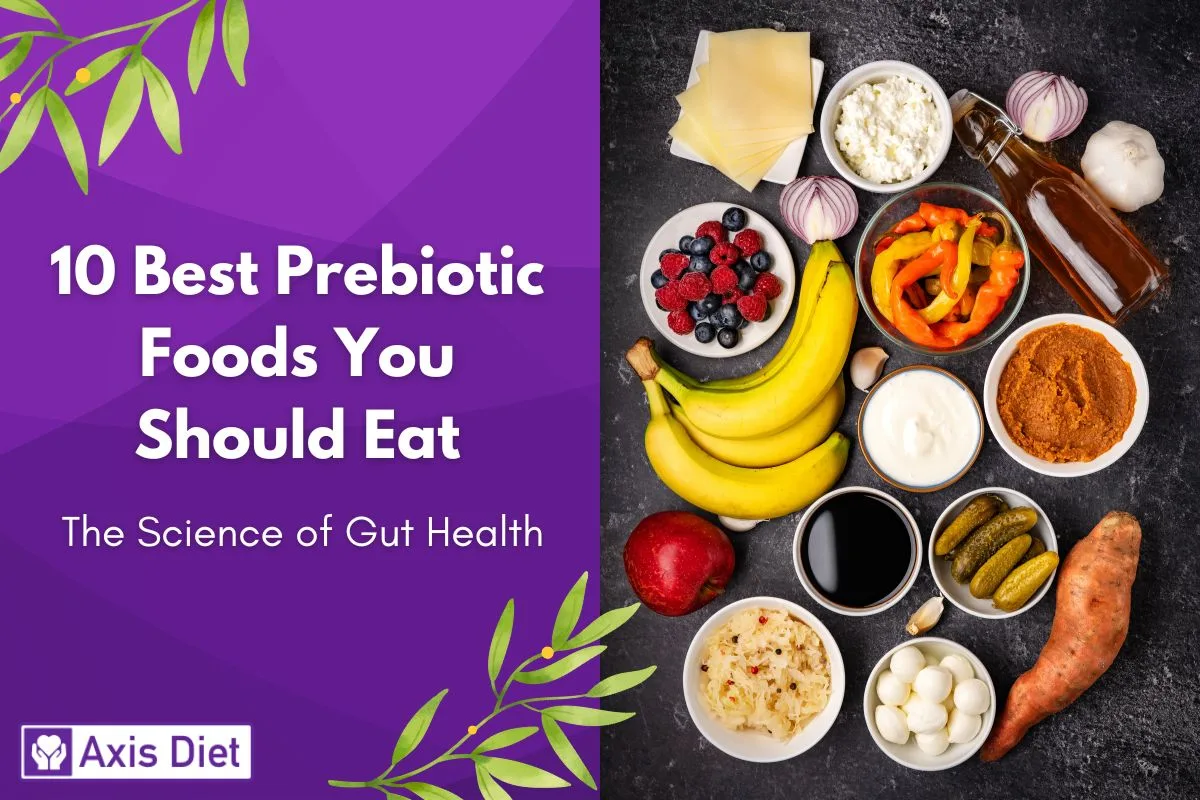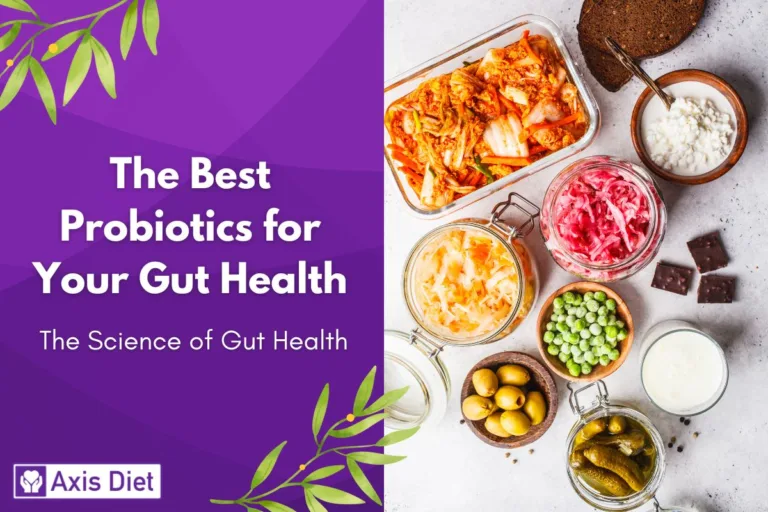
10 Best Prebiotics Food You Should Eat
In the realm of gut health, prebiotics have emerged as unsung heroes, playing a crucial role in maintaining our overall health and well-being. But to fully appreciate their value, it’s essential to understand their relationship with probiotics. Prebiotics are non-digestible fibers that act as food for probiotics—the beneficial bacteria residing in our gut. To grasp this concept further, dive into our detailed exploration on “What are Prebiotics & Probiotics? Understand the Difference.” Moreover, the synergy between prebiotics and probiotics is fascinating and pivotal for our digestive health. For an in-depth look at their interplay and benefits, check out “How Probiotics and Prebiotics Work Together? The Science of Gut Health.”
This article explores the top prebiotic foods you should consider incorporating into your diet and provides practical tips on how to do so. Beyond supporting gut health, prebiotics enhance nutrient absorption, boost the immune system, and may even help reduce the risk of certain diseases. Let’s explore the prebiotic-rich foods that are commonly consumed in India, ensuring a diverse and balanced intake of these gut-health champions.
Understanding Prebiotics
Prebiotics are a type of dietary fiber found in various fruits, vegetables, and grains. They pass through the stomach and small intestine undigested, reaching the colon where they feed the beneficial gut bacteria. This process not only helps maintain a healthy digestive system but also impacts other aspects of health, including mental health and immune function.
1. Garlic
Garlic is widely used in Indian cuisine, not just for its flavor but also for its health benefits. It’s rich in inulin and FOS, which enhance gut health, and allicin, offering antimicrobial and heart health benefits. It provides approximately 1.2 grams of fiber per 100 grams, inulin, and fructooligosaccharides (FOS) that support beneficial gut bacteria. Garlic is also rich in vitamin C, vitamin B6, and manganese, and contains allicin, which has antimicrobial properties and supports cardiovascular health.
2. Onions
A staple in Indian cooking, onions add flavor to dishes and provide inulin and FOS, supporting the growth of beneficial gut bacteria. A staple in many Indian dishes, onions are not only flavorful but also nutritious, containing about 1.7 grams of fiber per 100 grams. They are a good source of inulin and FOS, enhancing gut health. Onions are also rich in vitamin C and contain the flavonoid quercetin, providing antioxidant and anticancer benefits.
3. Bananas
Bananas, particularly those slightly green, are a common snack in India, offering 2.6 grams of dietary fiber per 100 grams. They’re a source of inulin and resistant starch, promoting healthy gut flora. Rich in potassium, vitamin C, and vitamin B6, bananas support heart health and provide sustained energy.
4. Whole Wheat
Common in Indian diets, whole wheat is a source of prebiotic fibers that promote gut health. It’s used in a variety of forms, including chapatis and other breads, providing essential nutrients and fiber. It provides about 12.2 grams of fiber per 100 grams, along with prebiotic benefits. Whole wheat is also a good source of protein, iron, magnesium, and several B vitamins, supporting overall health.
5. Lentils and Legumes
Lentils and legumes, including chickpeas, lentils, and beans, are a fundamental part of Indian cuisine. They’re high in fibers that act as prebiotics, protein, and essential nutrients. They offer about 15.6 grams of fiber per cup (cooked), with significant amounts of protein, iron, folate, and magnesium, making them an excellent choice for supporting gut health and providing essential nutrients.
6. Barley
Barley is used in Indian dishes like soups and stews. It’s a whole grain rich in beta-glucan, a soluble fiber with prebiotic benefits, supporting gut health and lowering cholesterol. Barley contains approximately 17.3 grams of fiber per cup (cooked). It’s rich in beta-glucan, a soluble fiber with prebiotic benefits that also helps lower cholesterol. Barley is a source of selenium, magnesium, and several B vitamins.
7. Oats
Increasingly popular in Indian breakfasts, oats are a good source of beta-glucan, which has prebiotic effects. They’re also beneficial for heart health and blood sugar control. Oats provide about 10.6 grams of fiber per cup (cooked). They’re a great source of beta-glucan, which supports gut health and heart health by lowering cholesterol. Oats are also rich in protein, magnesium, and zinc.
8. Green Peas
Widely consumed across India, green peas offer soluble fibers that act as prebiotics, supporting gut health. They’re also a good source of vitamins and protein. Green peas offer about 5.7 grams of fiber per cup (cooked), along with protein and vitamins A, C, and K. They contain soluble fibers that act as prebiotics, promoting a healthy gut microbiome.
9. Jowar (Sorghum)
Jowar, a traditional Indian grain, is rich in fibers that can have prebiotic effects. It’s also gluten-free, making it a good alternative for wheat and a source of protein and essential minerals. It provides about 6.3 grams of fiber per 100 grams. It’s a good source of protein, iron, and B vitamins, with gluten-free properties making it a healthy alternative to wheat for those with gluten sensitivities.
10. Fenugreek Seeds
Used both as a spice and a medicinal herb in India, fenugreek seeds are rich in soluble fiber, offering prebiotic benefits. They also help in controlling blood sugar levels and improving digestive health. Fenugreek seeds contain about 25 grams of fiber per 100 grams. They are also rich in iron, magnesium, and manganese, and have been shown to help control blood sugar levels. The soluble fiber in fenugreek seeds acts as a prebiotic, supporting digestive health.
The bottom line
Prebiotic foods are high in special types of fiber that support digestive health.
They promote the increase of friendly bacteria in the gut, help with various digestive problems, and even boost your immune system. Prebiotic foods have also been shown to improve metabolic health and even help prevent certain diseases. Since fiber content of these foods may be altered during cooking, try to consume them raw rather than cooked to gain the full health benefits.
With a variety of options available, you can take your time to find the best prebiotic foods for yourself and your gut.
Incorporating these food groups into your diet not only ensures a diverse and balanced intake of nutrients but also supports a healthy and thriving gut microbiome. By focusing on the inclusion of prebiotic-rich foods within these categories, you can enjoy the wide-ranging health benefits they offer, from improved digestion and nutrient absorption to a stronger immune system and better overall health.
Axis Diet is dedicated to empowering individuals with knowledge and practical advice for healthier living. Our articles, grounded in research and expert insights, aim to simplify complex nutritional concepts, offering a comprehensive understanding of various aspects of diet and wellness. While these articles are informative and a great starting point for anyone looking to improve their health, they are for informational purposes only.
For personalized, professional guidance tailored to your unique health needs, we encourage you to consult with Axis Diet’s registered dietitians. Reach out to us at https://www.axisdiet.com/contact/ for expert personalized guidance on your nutritional journey.



Comments are closed.